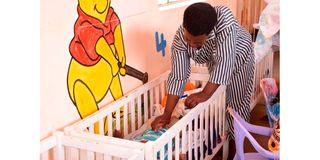Bright future for incarcerated mothers as Prisons launch childcare policy

An inmate at the Nyeri Women Prison, King’ong’o tends to her baby inside a nursery in the facility. The issue of children living with their incarcerated mothers in prison continues to be a contentious one.
What you need to know:
- Kenya Prisons Service has launched a childcare policy for children of incarcerated mothers.
- Policy launched by Interior Cabinet Secretary Dr Fred Matiang'i last week, lays emphasis on the children’s early childhood education.
The Kenya Prisons Service has launched a childcare policy for children of incarcerated mothers. This is a first of its kind in the African continent.
The policy aims to offer guidance to the Kenya Prisons Service management and other stakeholders to provide quality care for children of incarcerated mothers aged below four years.
It will provide a framework to strengthen efficient care of children accompanying their incarcerated mothers.
The policy, which was launched by Interior Cabinet Secretary Dr Fred Matiang'i at the Prisons Staff Training College in Ruiru, last week, lays emphasis on the children’s early childhood education.
The policy development was sponsored by Africa Early Childhood Network (AfECN).
The Kenya Prisons Service says the policy implementation is linked to other national policy guidelines including the Sessional paper No.1 of 2005 from the education sector, which touches on the policy framework for education that recommended the development of a comprehensive ECD framework and Service Standard Guidelines.
“The policy institutionalizes provisions that address shortcomings to give children accompanying imprisoned mothers equal opportunities as those in normal learning institutions,” said Dr Matiang'i during the launch.
Nurturing environment
The launch of the policy follows a recent study by AfECN that showed Kenyan prisons face myriad challenges including lack of a policy to guide the provision of a nurturing environment for children, besides insufficient funds to provide clothing, medication, food, and bedding.
The AfECN report on Status of childcare services in women’s prison in Kenya released last year, also indicates that the children’s mental health and wellbeing was at risk as they are exposed to a unique environment, confined with their mothers even though they are not convicts.
The report says that of the 43 female penal institutions in the country, only 10 are well facilitated with day-care centres, representing slightly less than a quarter of all facilities.
“Due to lack of privacy, women often undress in the presence of all the other women and their children, either because they are oblivious of the effects of this act on their children, or due to lack of options,” the report adds.
Nurturing care
The study adds that children are exposed to situations where their mothers may fight or quarrel over a myriad interpersonal issues, hurl insults and abuses at each other and other kinds of behaviour that a child ought not to experience.
“Given that children learn by observation, they may grow up knowing that this is the normal way of life and may pick up criminal behaviour,” the report also shows.
The study recommends nurturing care for early childhood development interventions in female penal institutions to create safe nurturing spaces for children.
The study also recommends the lowering of the statutory age when the children can leave the prisons.
Currently, mothers are by law, permitted to have their children till they reach four years.





